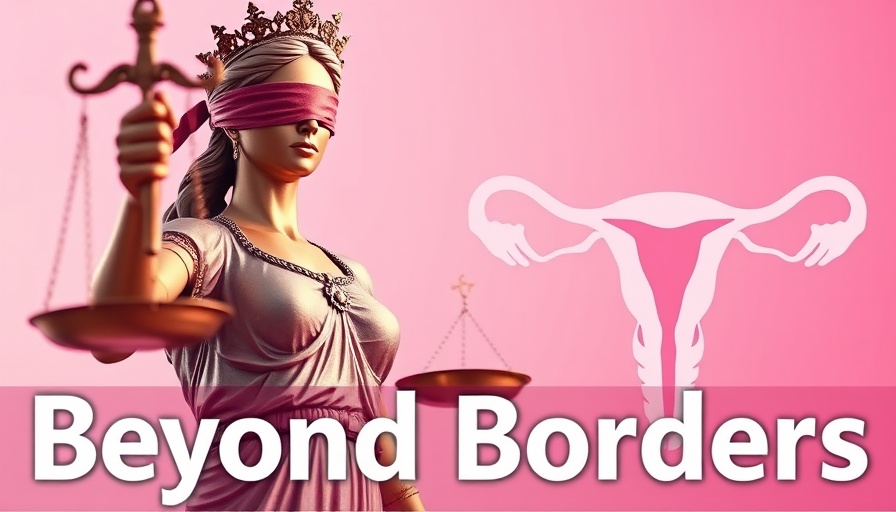
Understanding the Connection Between Gender-Based Violence and Reproductive Rights
The ongoing dialogue around gender-based violence (GBV) and reproductive rights, particularly abortion rights, has risen sharply in recent years. As South Africa grapples with issues stemming from historical inequalities and current socio-political pressures, the intersection of these two vital areas merits urgent attention. This article explores how restricted abortion rights are intricately linked to the prevalence of GBV, a concern echoed by various advocacy groups, including Women's Rights organizations in South Africa and international coalitions.
A Historical Context: South Africa’s Struggle
In South Africa, the struggle for women’s rights has always been intertwined with the fight against apartheid and systemic oppression. The post-apartheid constitution enshrined the rights of individuals, promoting equality irrespective of gender. However, the persistent high rates of GBV highlight that legislation alone is not enough. The persistent societal norms and structural violence against women underscore the urgent need for laws that protect these rights, including access to safe abortion services. It’s important to recognize how South Africa’s history continues to shape gender dynamics today, impacting legislative policies regarding GBV and sexual health.
Impact of Government Policies on GBV and Reproductive Rights
Government policies play a prominent role in shaping the environment within which individuals navigate their reproductive rights. Recent decisions made in various provincial governments showcase varying levels of support for women’s reproductive health services. While the South African government has established frameworks for gender equality, the execution of these policies often varies, influenced by local political landscapes— making the case for consistent national policies critical.
The Consequences of Restricted Abortion Rights
Research indicates a direct link between restricted abortion rights and increased incidents of GBV. When women are denied control over their reproductive choices, their vulnerability to violence escalates. This is further compounded by stigma and fear of judgment from society, driving women to unsafe abortion practices that threaten their health and life. The International Federation of Gynecology and Obstetrics (FIGO) has repeatedly emphasized the health risks posed by denying safe and legal access to abortion, arguing for a comprehensive health care model that includes reproductive health as a fundamental human right.
Counterarguments: Diverse Perspectives on the Issue
The debate surrounding abortion rights is multifaceted, with various groups advocating for different stances. While pro-choice advocates highlight personal agency and health considerations, anti-abortion groups emphasize moral and ethical concerns. It is crucial, however, to acknowledge the voices of marginalized communities who are often at the heart of these policies yet remain unheard in mainstream discourses. Engaging with these diverse perspectives can enhance understanding and lead to more inclusive policies that address the nuances of GBV and reproductive rights.
The Future of GBV and Reproductive Rights in South Africa
As South Africa heads towards critical national elections, the intersectionality of GBV and reproductive rights will likely influence voters. Political parties will need to address these interconnected issues if they hope to resonate with an electorate that is increasingly aware of social justice issues. Promisingly, some initiatives within political frameworks aim to tackle gender-based violence head-on, suggesting a shift toward prioritizing the rights of women in future policies. However, sustaining this momentum will require continued activism and public engagement.
Taking Action: What Can Be Done?
For professionals interested in contributing to the discourse around GBV and reproductive rights, several actionable insights can foster progress. Engaging in community outreach, supporting advocacy groups, and raising awareness about the importance of safe reproductive health services are essential steps. Legal professionals can also play a role by ensuring that existing laws are effectively implemented and by advocating for the reforms necessary to protect women’s rights holistically.
Conclusion: The Urgency of the Matter
In summation, the link between gender-based violence and restricted abortion rights is a pressing issue that demands immediate attention from policymakers, social activists, and the public. Understanding how these issues are interwoven can aid in crafting effective strategies that address root causes rather than symptoms. Advocacy for comprehensive reproductive rights and protections against GBV is not merely an option but a necessity for achieving gender equality in South Africa.
 Add Row
Add Row  Add
Add 




Write A Comment